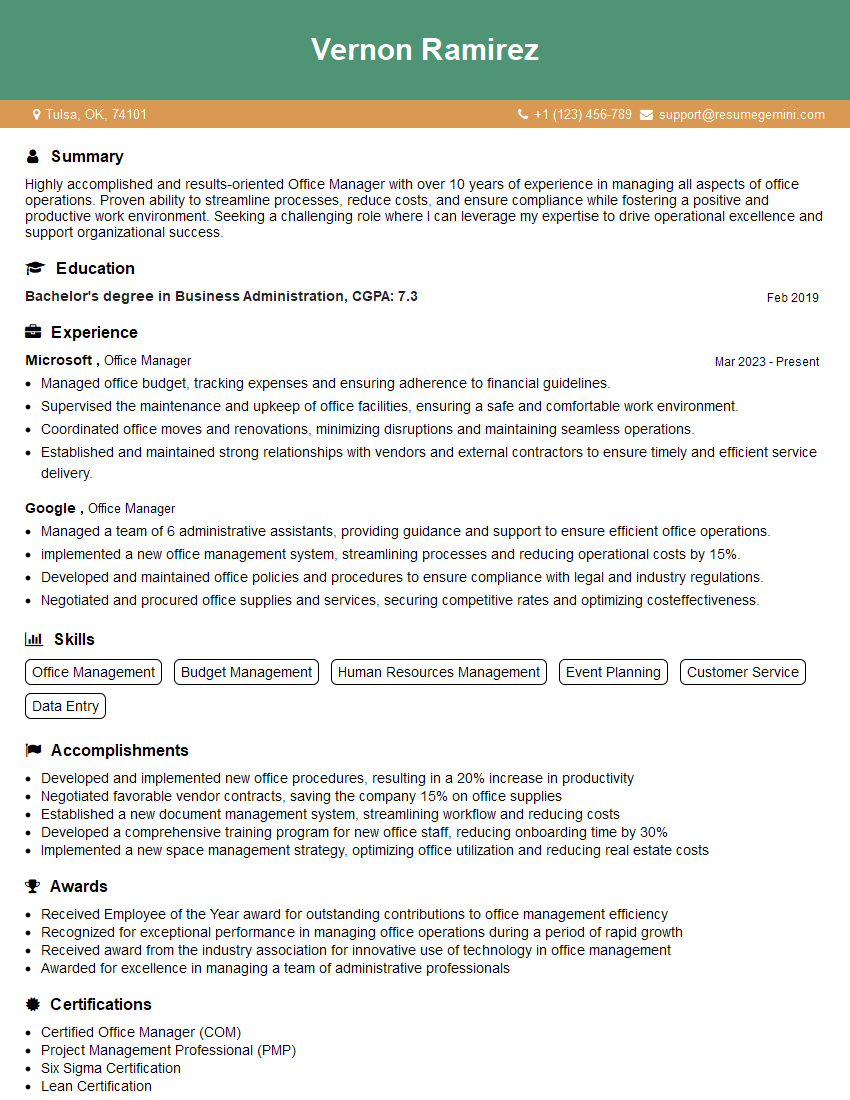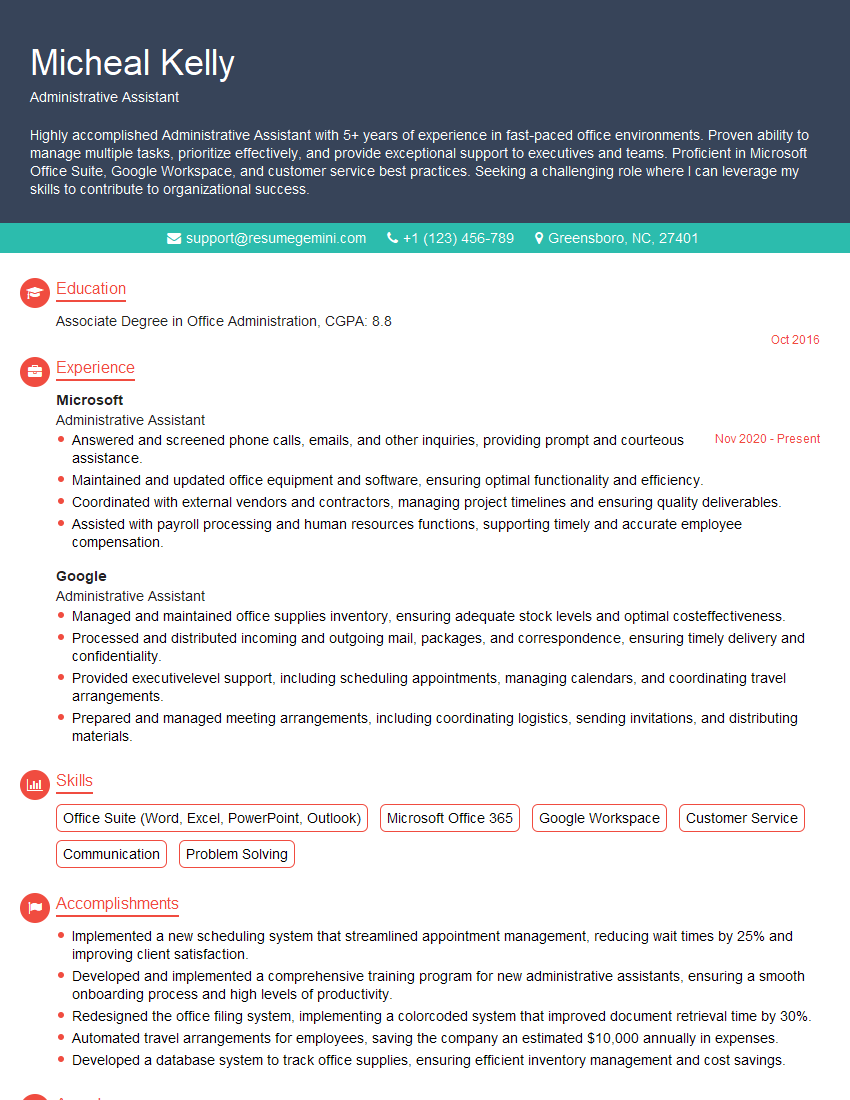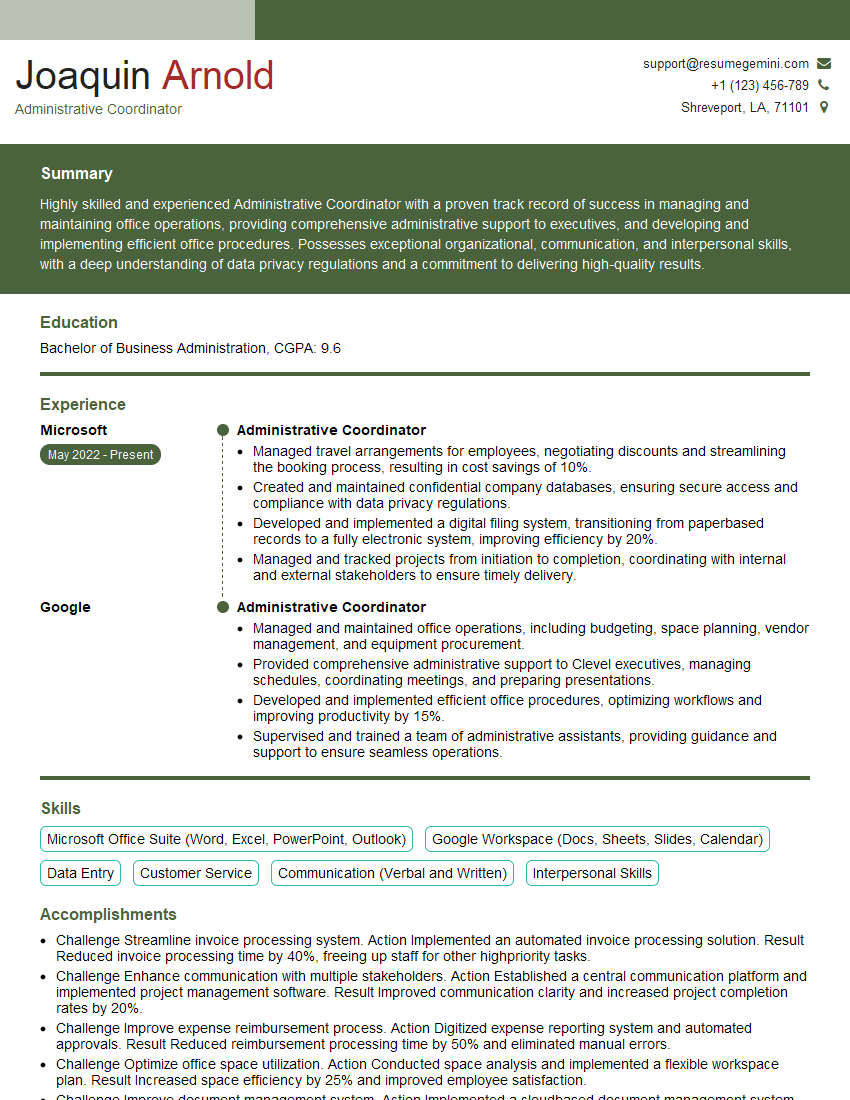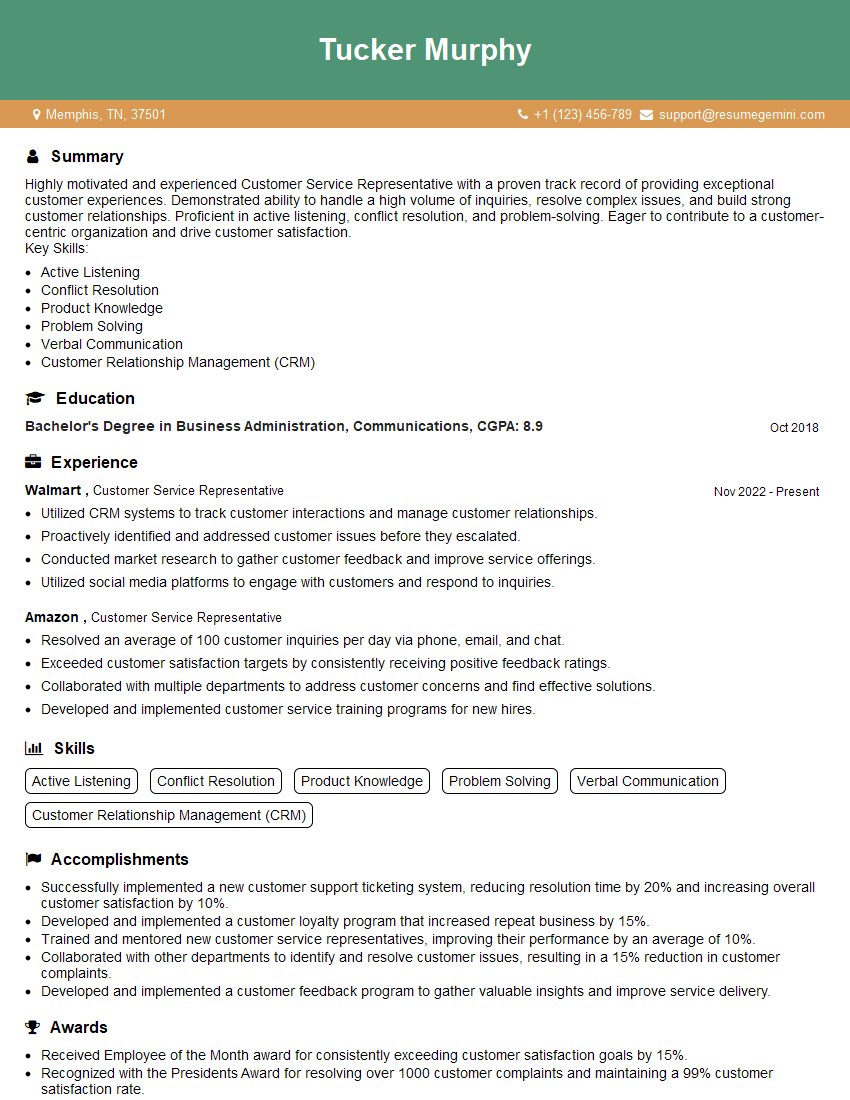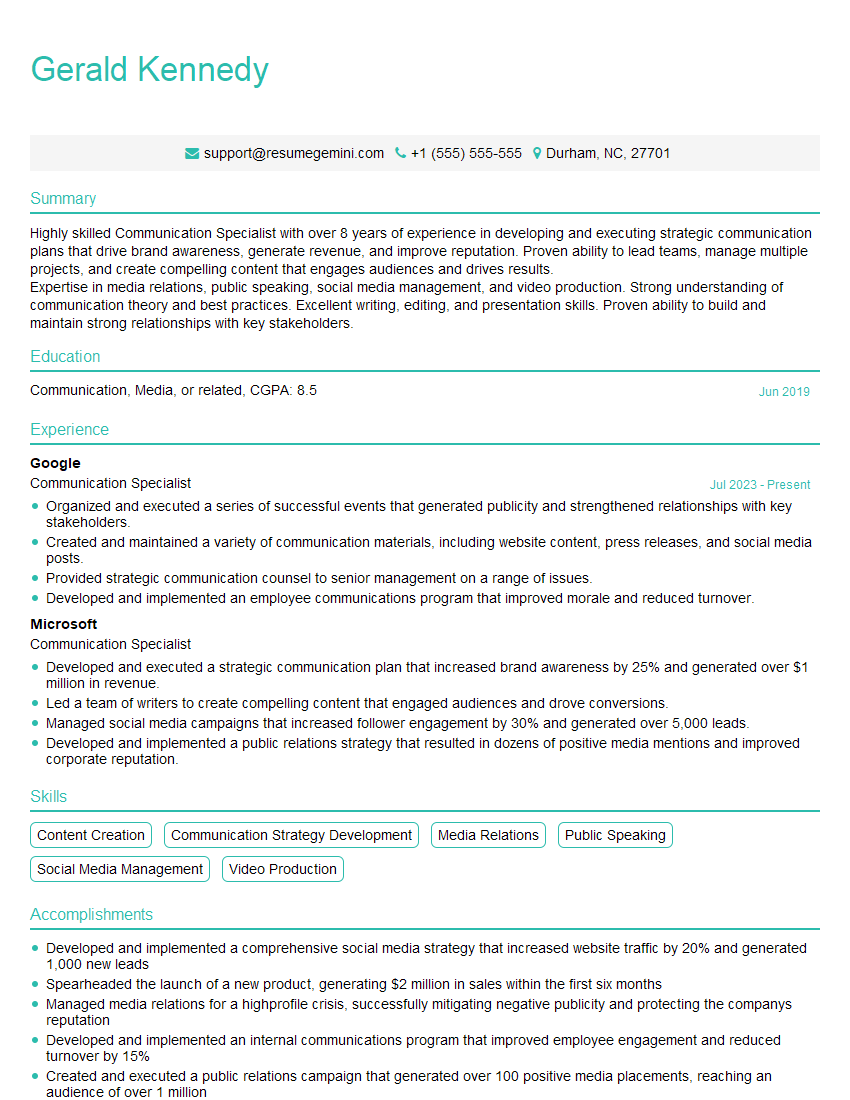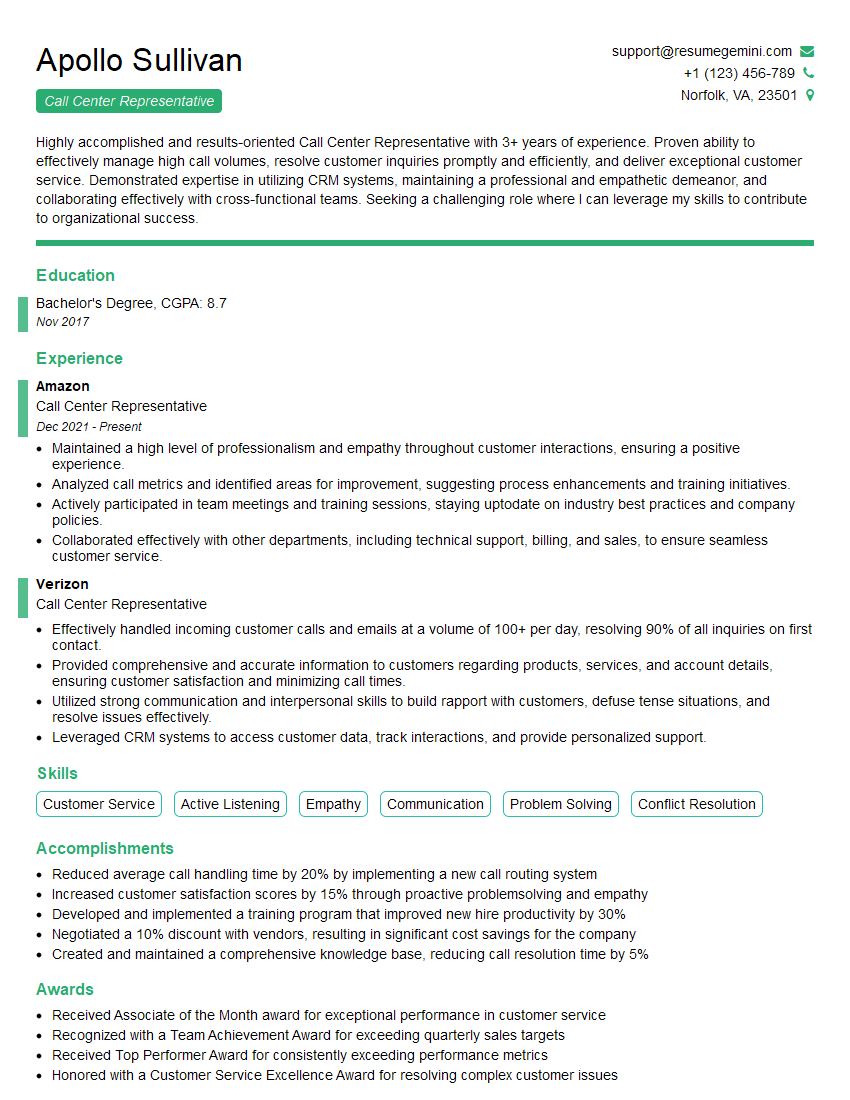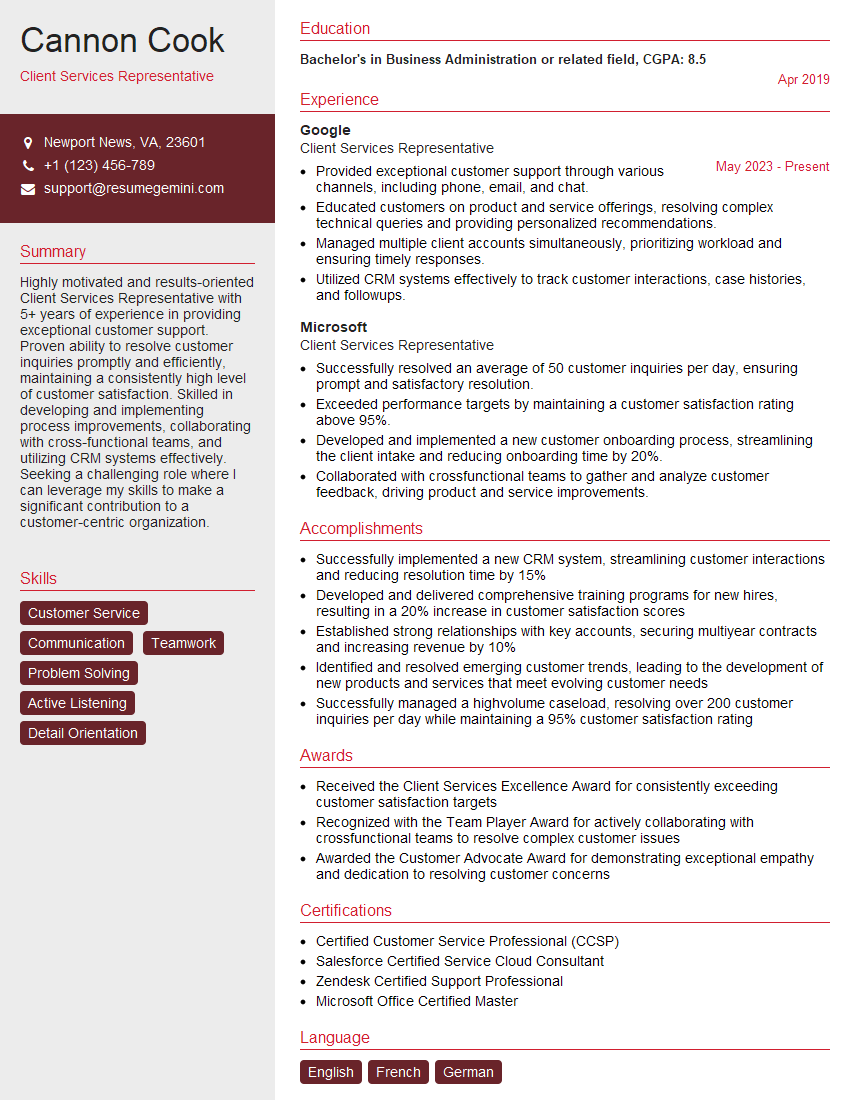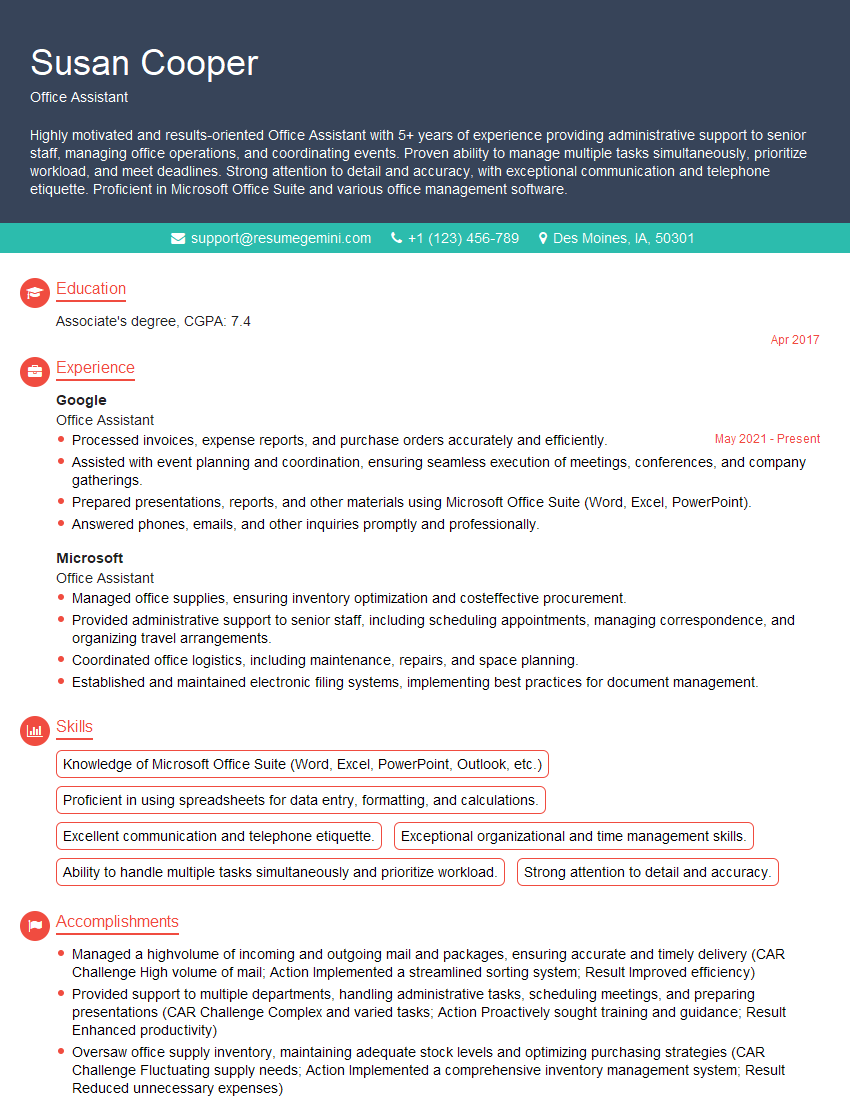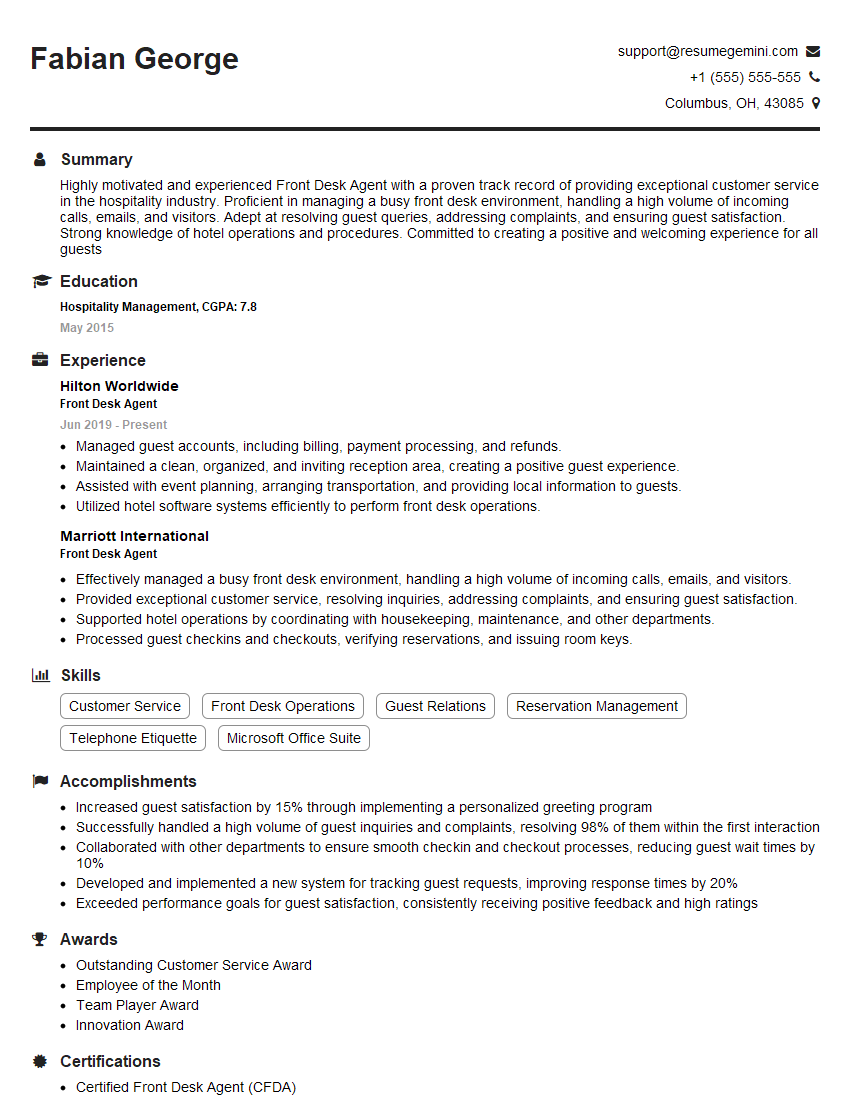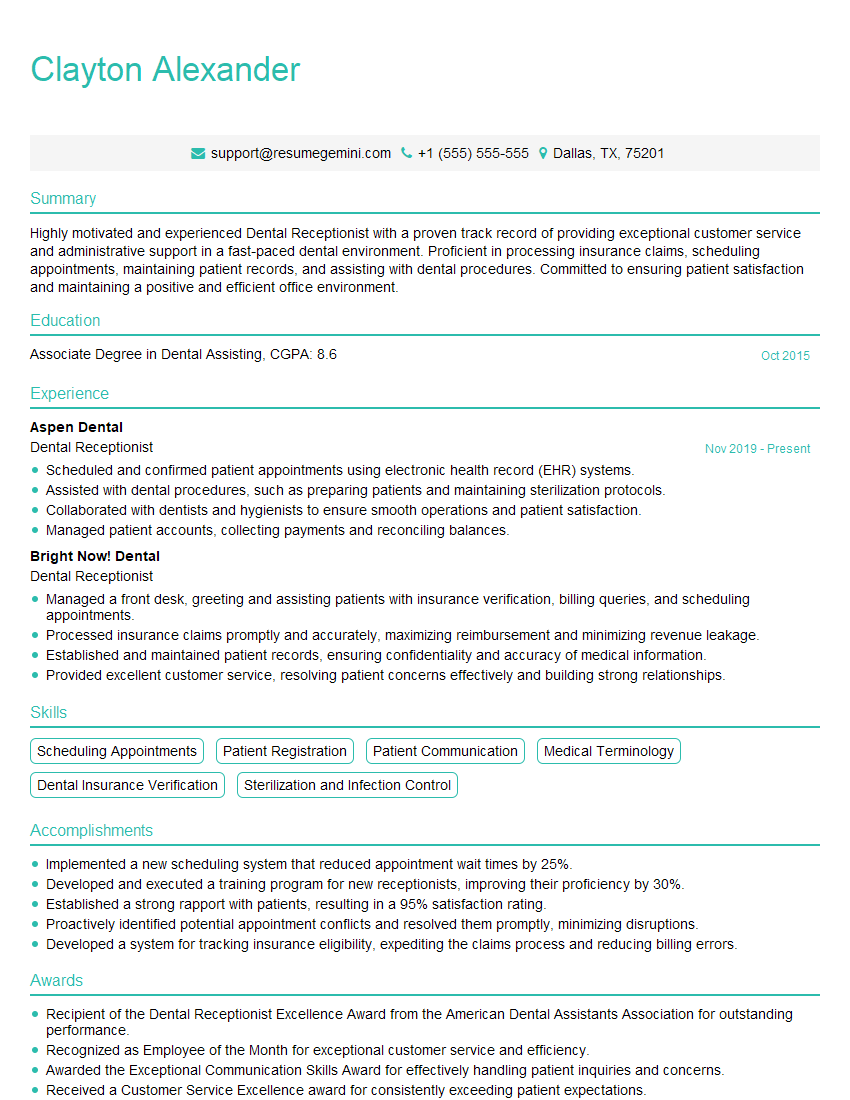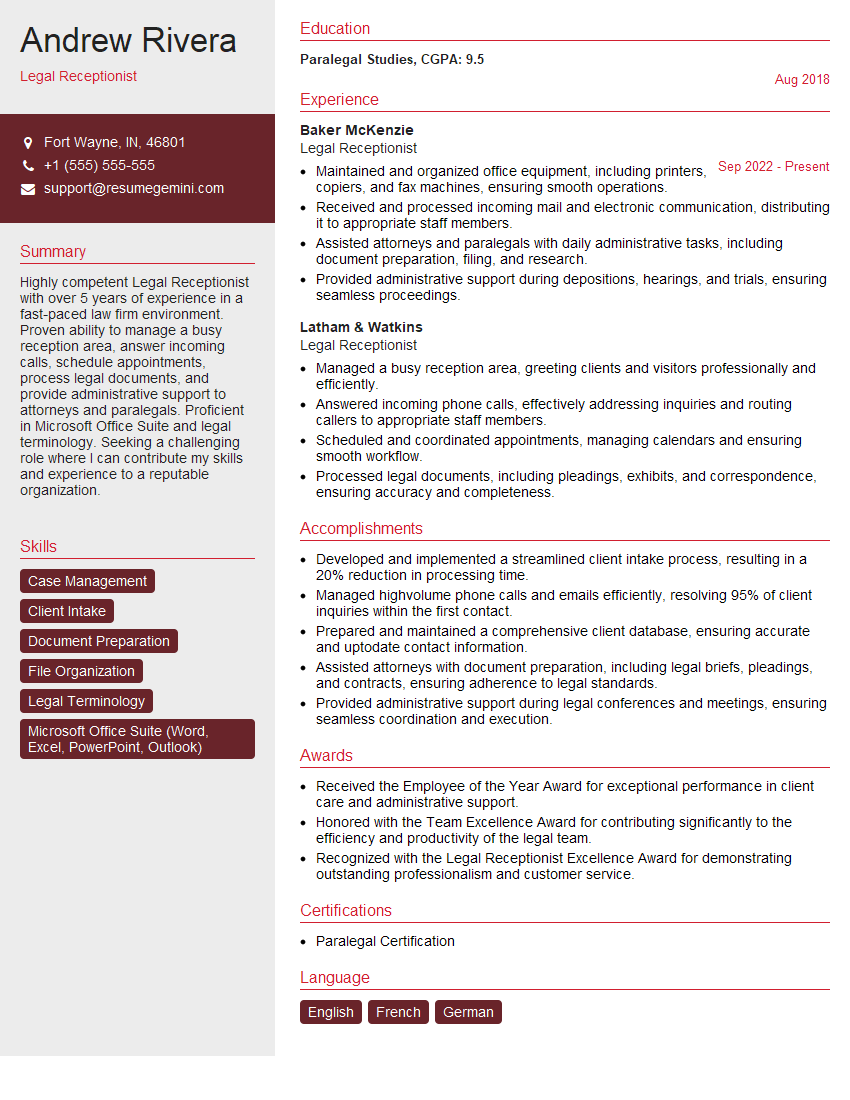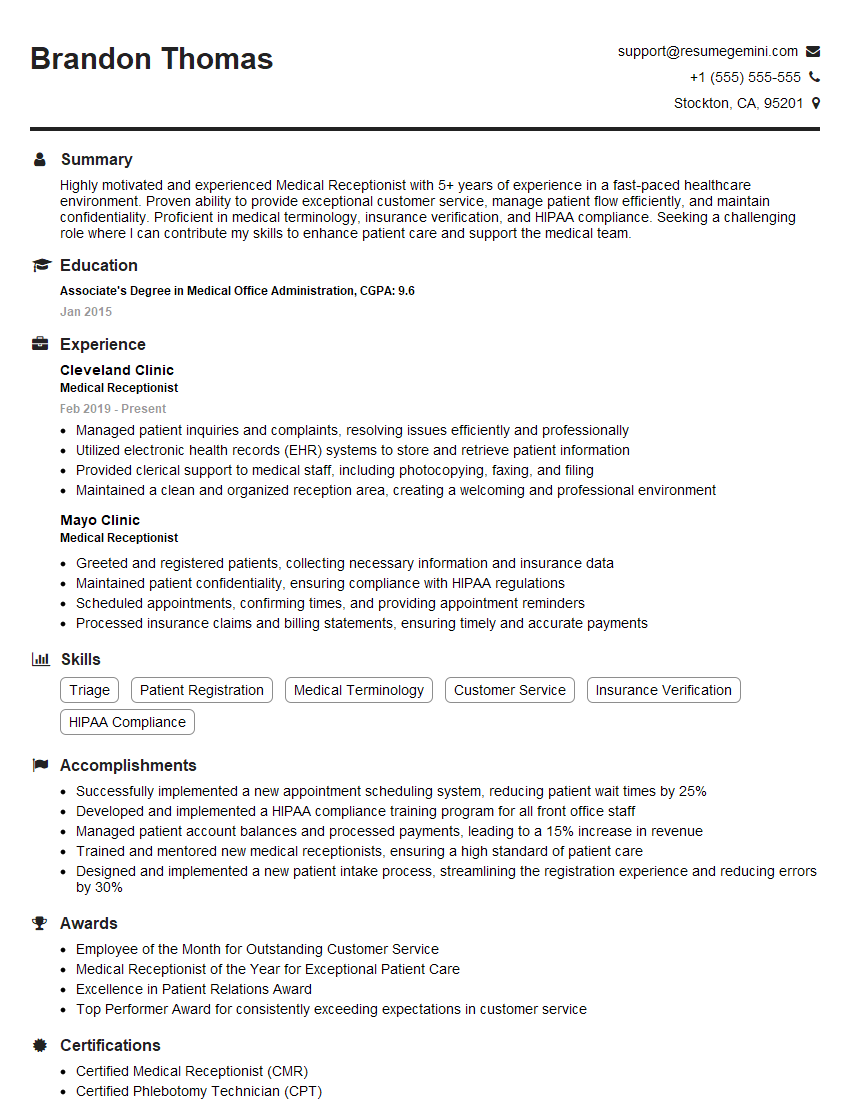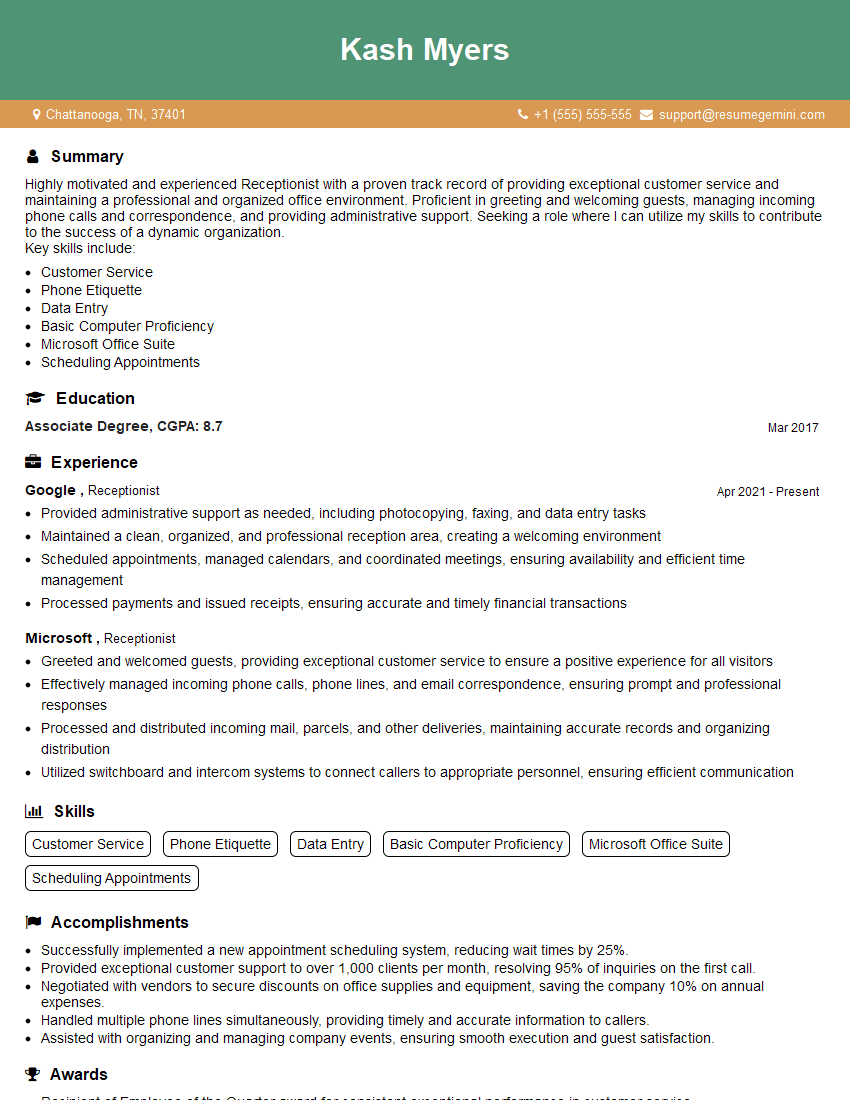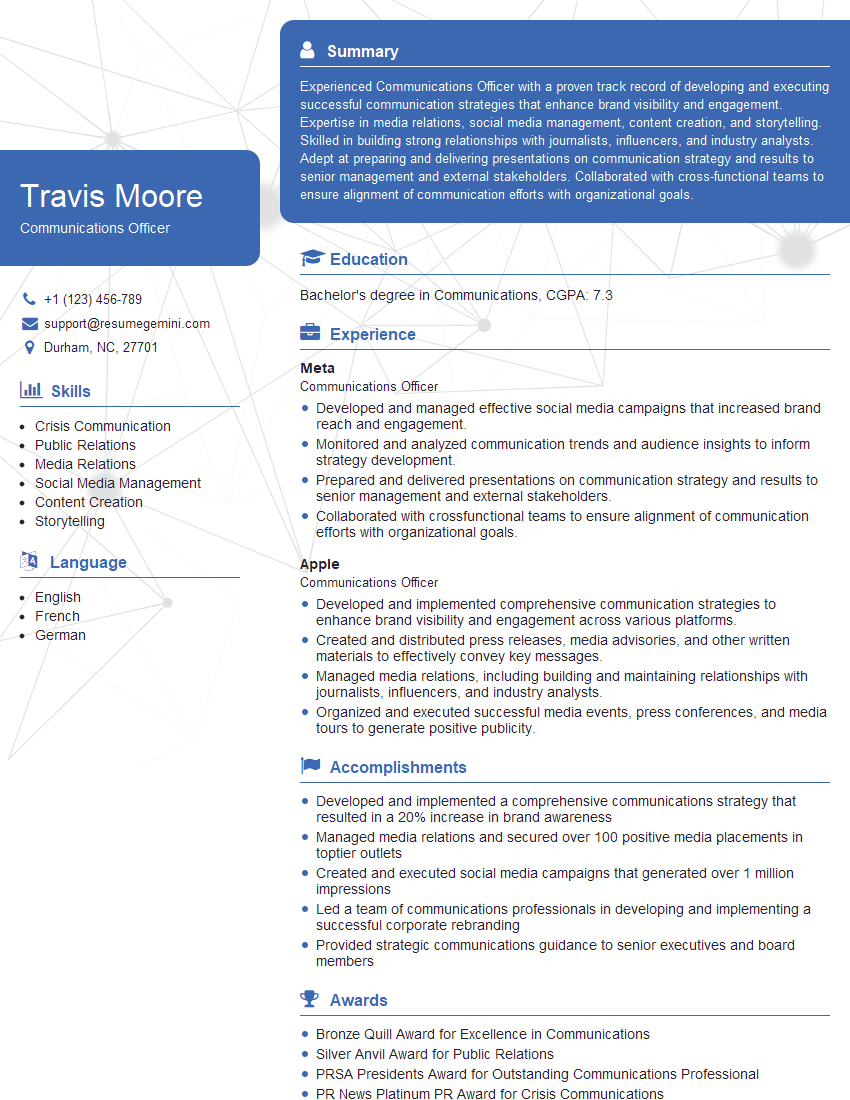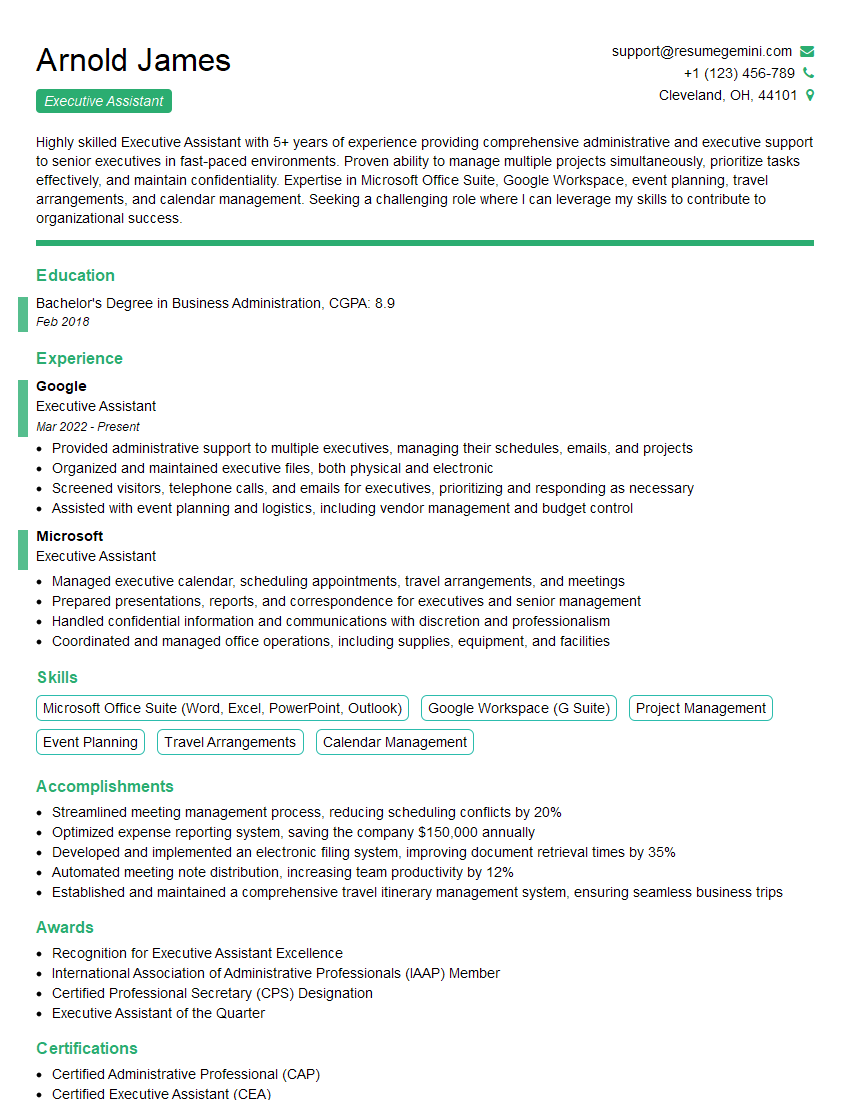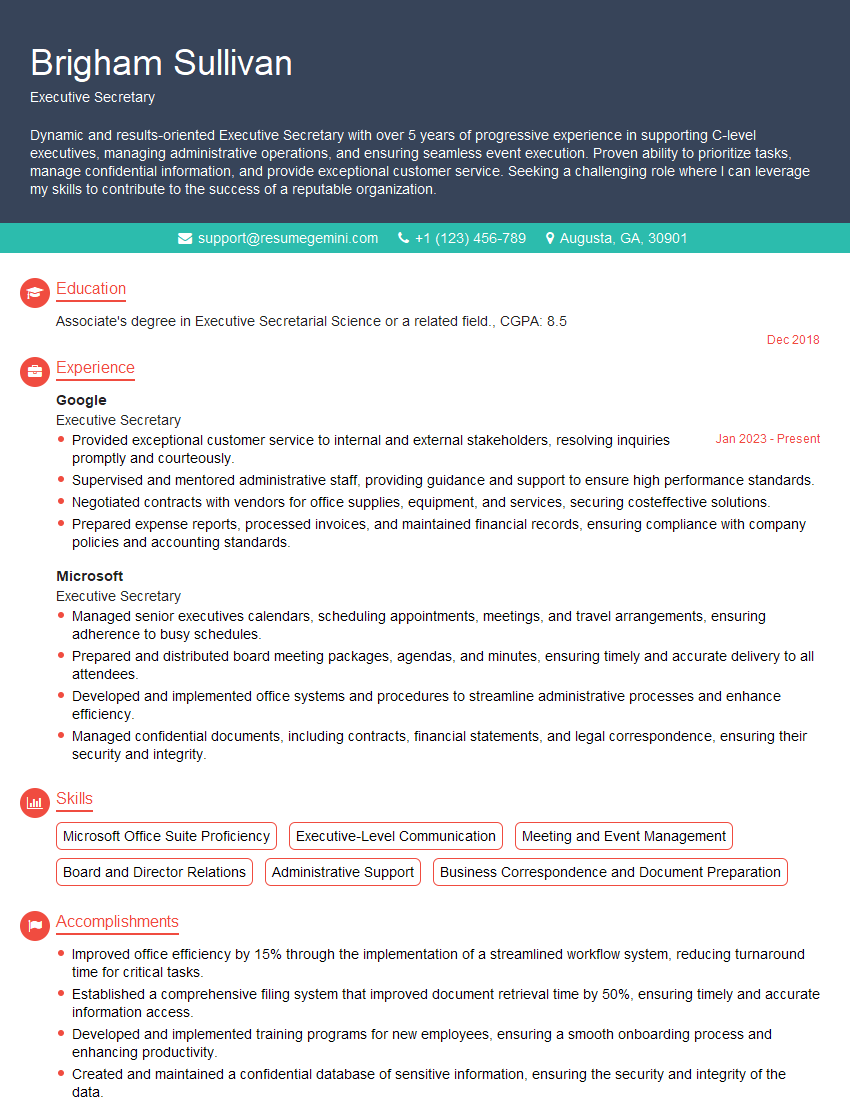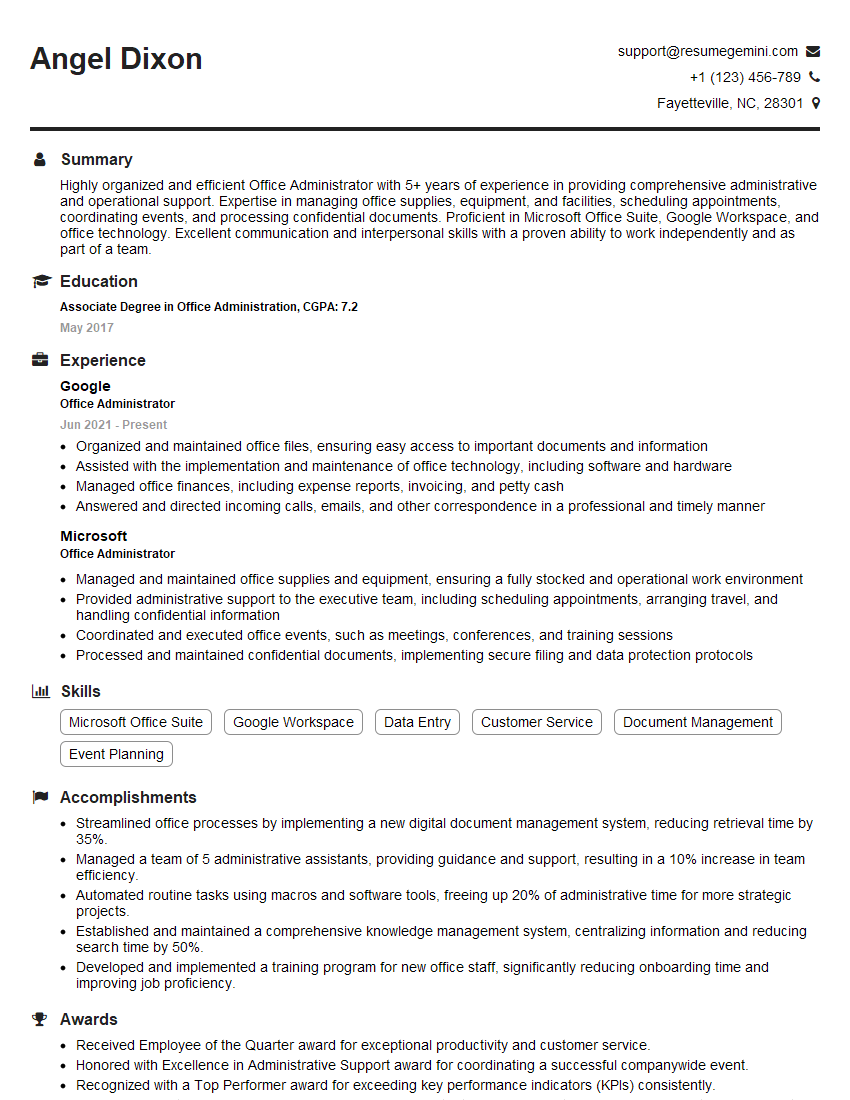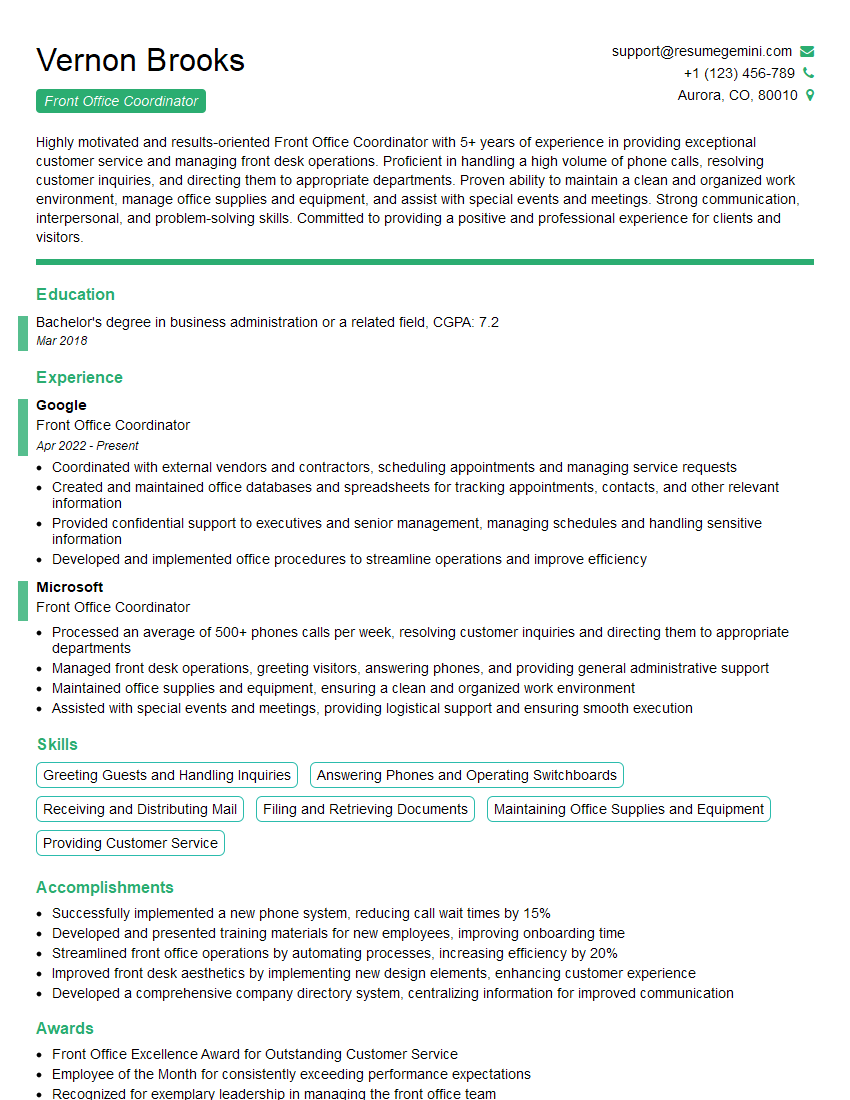Unlock your full potential by mastering the most common Telephone and reception duties interview questions. This blog offers a deep dive into the critical topics, ensuring you’re not only prepared to answer but to excel. With these insights, you’ll approach your interview with clarity and confidence.
Questions Asked in Telephone and reception duties Interview
Q 1. Describe your experience handling high call volumes.
Handling high call volumes efficiently requires a combination of skills and strategies. It’s not just about speed, but about maintaining quality and accuracy under pressure. In my previous role at [Previous Company Name], we experienced peak call volumes during specific times of the day and year. To manage this, I employed several techniques:
- Prioritization and Triage: I learned to quickly assess the urgency of each call. Emergency calls or those from VIP clients were given immediate attention. Less urgent calls were placed in a queue to be handled systematically.
- Multitasking Mastery: While handling a call, I was adept at using my phone system to put callers on hold briefly while attending to urgent tasks or retrieving information. This kept calls moving forward without undue delays.
- Call Scripting (Where Appropriate): For frequently asked questions, I utilized concise and well-rehearsed responses to handle calls quickly and effectively without compromising clarity.
- Teamwork: When call volumes were overwhelming, I proactively collaborated with colleagues, offering assistance to ensure timely response times and avoid long customer wait times.
For example, during our annual enrollment period, call volumes tripled. By employing these strategies, we managed to keep average wait times under two minutes, exceeding expectations and maintaining high customer satisfaction.
Q 2. How do you prioritize multiple tasks and incoming calls?
Prioritizing multiple tasks and incoming calls is a crucial skill for any receptionist. I use a system that combines urgency, importance, and time sensitivity. Think of it like a tiered system:
- Tier 1: Immediate Attention: This includes emergency calls, critical issues, calls from executives, or time-sensitive requests. These are handled immediately, even if it means putting other tasks on hold.
- Tier 2: High Priority: These are important tasks with deadlines, but not immediately critical. For example, scheduling appointments or forwarding urgent messages. I’ll work on these while managing lower-priority tasks and calls.
- Tier 3: Low Priority: These are routine tasks that can be completed later. Examples include filing, data entry or responding to non-urgent emails. I work on these in the lulls between calls or tasks.
I employ time management techniques such as the Pomodoro Technique to maintain focus and ensure tasks are completed efficiently without feeling overwhelmed.
Q 3. Explain your method for screening and directing calls.
Screening and directing calls requires a combination of active listening and efficient information gathering. My method begins with a friendly greeting and the immediate identification of the caller’s needs. I ask qualifying questions:
- Identify the Caller: I politely ask for their name and company to ensure a personalized experience.
- Determine the Purpose: I listen attentively to their request to understand their purpose for calling.
- Direct the Call: Based on their needs, I either connect them to the appropriate person or department, or take a message and ensure it’s properly delivered.
- Take Accurate Messages: If the recipient is unavailable, I take a detailed message including the caller’s name, company, phone number, and the nature of their call. This helps in ensuring timely follow up.
For example, if a caller asks for the sales department, I might ask, “Is this regarding a new product inquiry or an existing account?” This allows me to direct them to the most appropriate person within the sales team for faster resolution.
Q 4. How do you handle difficult or irate callers?
Handling difficult or irate callers requires patience, empathy, and strong communication skills. My approach focuses on de-escalation and finding a solution:
- Listen Empathetically: I let the caller express their concerns without interruption. This shows that I care and allows them to release their frustration.
- Validate Their Feelings: I acknowledge their frustration, using phrases like, “I understand your frustration,” or “I can see why you’re upset.” This demonstrates empathy.
- Remain Calm and Professional: I maintain a calm and respectful tone, even if the caller is not.
- Offer a Solution: I try to find a solution to their problem, either by connecting them to the right person or offering information to resolve their issue.
- If Necessary, Seek Help: For extremely difficult situations, I seek assistance from a supervisor to ensure the caller’s concerns are addressed effectively.
For instance, if a customer is upset about a late shipment, I would first listen to their concerns, then apologize for the inconvenience, offer to track the shipment and provide an estimated delivery date, and potentially offer a small compensation for the inconvenience.
Q 5. What software or systems are you proficient in (e.g., phone systems, scheduling software)?
I am proficient in several software and systems commonly used in telephone and reception duties:
- Phone Systems: I have extensive experience with various PBX (Private Branch Exchange) systems, including [List Specific Systems e.g., Avaya, Cisco, Mitel], managing call routing, voicemail, and call forwarding.
- Scheduling Software: I am skilled in using scheduling platforms like [List Specific Software e.g., Calendly, Google Calendar, Outlook Calendar] to manage appointments, meetings, and coordinate schedules across multiple users.
- CRM Systems: I have worked with CRM (Customer Relationship Management) software such as [List Specific Software e.g., Salesforce, HubSpot], managing customer data and tracking communications effectively.
- Microsoft Office Suite: I am highly proficient in Microsoft Word, Excel, and PowerPoint, frequently using these tools for documentation, data entry, and presentations.
My skills in these systems allow for seamless integration of different business functions and enhanced communication efficiency.
Q 6. Describe your experience with taking messages and ensuring accurate delivery.
Taking accurate messages and ensuring their timely delivery is critical for effective communication. My process involves several steps:
- Gather Complete Information: I collect the caller’s name, phone number, company (if applicable), and a detailed description of their message. For calls requiring immediate action, I write down specific requests, deadlines, and any relevant information.
- Confirm Information: After taking the message, I repeat the key details back to the caller to ensure accuracy and understanding.
- Timely Delivery: Once I’ve confirmed the accuracy, I deliver the message to the intended recipient promptly. If the recipient is not immediately available, I make sure the message gets to them as soon as possible.
- Follow-Up (If Necessary): For critical messages, I may follow up to ensure the recipient received and understood the message. For example, confirming an appointment or verifying an urgent request.
I maintain a detailed log of all messages received, including date, time, caller information, recipient, and the message itself. This allows for easy retrieval and tracing of communication.
Q 7. How do you maintain confidentiality of sensitive information?
Maintaining confidentiality is paramount in any role handling sensitive information. I adhere to strict protocols to protect privacy:
- Compliance with Company Policies: I am thoroughly familiar with and strictly adhere to my company’s confidentiality policies and procedures.
- Data Security: I understand and practice secure data handling methods, including password protection, secure file storage, and appropriate disposal of sensitive documents.
- Discreet Communication: I avoid discussing sensitive information in public areas or with unauthorized individuals.
- Limited Access: I only share information with authorized personnel, strictly adhering to the ‘need-to-know’ principle.
- Reporting Breaches: In the unlikely event of a security breach, I promptly report it to the appropriate personnel to initiate immediate action.
I am committed to upholding professional ethical standards and prioritizing data security to maintain the confidentiality of sensitive information entrusted to me.
Q 8. How do you handle situations where you don’t have an answer to a caller’s question?
When faced with a question I can’t immediately answer, my priority is to reassure the caller that I’m working to find the solution. I never say ‘I don’t know’ without a plan of action. Instead, I use phrases like, ‘Let me check on that for you’ or ‘I’ll find the information and get back to you shortly.’ Then, I immediately begin my search, utilizing available resources such as internal directories, company intranet, or contacting the appropriate colleague.
For example, if a caller inquires about a specific product detail I am unfamiliar with, I’d politely say, ‘One moment please, I’ll connect you with our product specialist.’ If the answer requires research, I’ll provide a timeframe for follow-up, ‘I’ll research this and call you back within 15 minutes with the answer.’ Following up promptly and providing accurate information is crucial for maintaining caller satisfaction and building trust.
Q 9. Describe your experience with greeting visitors and managing their check-in process.
Greeting visitors is the first step in creating a positive company image. I always aim for a warm and professional welcome. My experience involves verifying visitor identities against appointment schedules, issuing visitor badges, providing directions, and ensuring visitors feel comfortable and welcomed. I’ve managed check-in processes in various settings, from small offices to large corporate environments, adapting my approach depending on the company culture and security protocols. This involves using visitor management systems, signing guests in and out, handling any unexpected situations, and notifying the appropriate personnel of their arrival.
For instance, in my previous role, we used a digital visitor management system that required visitors to scan their driver’s licenses and provide contact information. I was responsible for troubleshooting any technical difficulties and guiding visitors through the process. In another role, I handled high-volume visitor traffic, prioritizing efficiency and ensuring minimal wait times while maintaining a friendly demeanor.
Q 10. How do you ensure a positive and professional first impression?
A positive first impression hinges on several key factors. It starts with a warm and genuine smile, a confident and clear greeting such as ‘Good morning/afternoon, welcome to [Company Name], how may I assist you?’ My tone of voice is crucial; ensuring it’s pleasant, professional, and enthusiastic, even if I’m handling multiple tasks. My appearance also reflects professionalism – neat attire and a well-maintained workspace contribute to a positive initial perception. Prompt and efficient service reinforces this positive image. I make eye contact and actively listen, ensuring I fully understand the visitor’s or caller’s needs.
For example, anticipating a caller’s needs by already having access to their contact details and a summary of their previous interactions can make them feel valued. A simple ‘It’s great to speak with you again, Mr. Smith. How can I help today?’ shows initiative and elevates the customer experience. In essence, it’s a combination of verbal and nonverbal cues, all designed to project confidence, warmth, and efficiency.
Q 11. How do you manage your time effectively in a busy reception area?
Effective time management in a busy reception area is vital. I prioritize tasks using a system that balances urgency and importance. I often utilize techniques like creating to-do lists, prioritizing tasks based on deadlines, and allocating specific time slots for different activities. Multitasking is essential, but I avoid spreading myself too thin; instead, I focus on completing one task efficiently before moving to the next. Learning to anticipate needs helps; for example, pre-preparing frequently requested documents and materials saves significant time.
For instance, if I know a meeting is about to start, I’ll ensure the meeting room is set up and refreshments are ready before answering other calls. Using a queuing system for visitors or calls, if applicable, ensures fairness and efficiency. Furthermore, I stay organized by keeping my workspace tidy and having a system for managing incoming mail and messages, preventing time being wasted searching for items.
Q 12. What is your experience with appointment scheduling and calendar management?
My experience with appointment scheduling and calendar management includes using various software programs like Microsoft Outlook, Google Calendar, and specialized scheduling applications. I am proficient in creating, modifying, and managing appointments, ensuring accurate recording of details such as date, time, participants, and purpose. I can handle conflicting appointments, reschedule as needed, and send timely reminders to both clients and internal staff. I am comfortable working with multiple calendars, coordinating schedules across different teams, and ensuring efficient resource allocation.
In a previous role, I managed the calendars for a team of five executives, coordinating their schedules across multiple time zones. This involved understanding their individual preferences and priorities, proactively anticipating potential scheduling conflicts, and suggesting optimal times for meetings. Proficiency in these skills ensures minimal disruption and efficient use of everyone’s time.
Q 13. Describe your experience with handling mail and deliveries.
Handling mail and deliveries is a routine part of my reception duties. I am experienced in sorting, distributing, and recording incoming and outgoing mail, ensuring timely delivery to the appropriate recipients. This involves knowing the internal mail distribution system, handling registered and couriered items, and maintaining accurate records. I’m also adept at managing deliveries, including signing for packages, notifying recipients, and handling any potential issues like damaged goods or incorrect addresses. I meticulously follow established procedures to ensure security and accountability for all mail and deliveries.
For example, I’ve had experience with confidential mail and followed strict protocols for handling them, including logging each piece of mail, documenting who received it, and maintaining a secure storage system for sensitive items. Proper record keeping is essential to track deliveries and respond efficiently to inquiries about missing items.
Q 14. How familiar are you with different types of telephone systems?
I am familiar with various telephone systems, from traditional PBX systems (Private Branch Exchange) to modern VoIP (Voice over Internet Protocol) systems. I understand the functionalities of each, including call forwarding, call waiting, conference calling, voicemail systems, and call recording. I’m proficient in using different telephone system interfaces and troubleshooting basic technical issues. My experience extends to handling multi-line phone systems and managing call queues effectively.
I’ve worked with both analog and digital phone systems and understand the differences in their operation and maintenance. Furthermore, I’m comfortable learning new systems quickly, adapting to the specific features and functionalities required in different workplaces. My understanding of various systems allows me to provide efficient and professional phone support, regardless of the specific technology used.
Q 15. How do you handle incoming faxes and emails?
Handling incoming faxes and emails efficiently requires a systematic approach. For faxes, I ensure the machine is properly maintained and regularly checked. Upon receiving a fax, I immediately assess its content and determine the appropriate action. This could involve distributing it to the relevant recipient, scanning it into a digital format for easier storage and access, or filing it according to company protocol. I meticulously track all faxes received, noting the sender, date, and time of receipt in a log. Email management is similarly structured. I utilize folders and labels to organize incoming messages based on priority, sender, or subject matter. Urgent emails are addressed immediately, while others are prioritized based on their urgency and relevance. I also set up filters to automatically route emails to specific folders, improving efficiency and reducing inbox clutter. For instance, I might create filters to automatically move all emails from a specific client into a designated folder. This prevents crucial information from being overlooked and allows for more efficient workflow.
Career Expert Tips:
- Ace those interviews! Prepare effectively by reviewing the Top 50 Most Common Interview Questions on ResumeGemini.
- Navigate your job search with confidence! Explore a wide range of Career Tips on ResumeGemini. Learn about common challenges and recommendations to overcome them.
- Craft the perfect resume! Master the Art of Resume Writing with ResumeGemini’s guide. Showcase your unique qualifications and achievements effectively.
- Don’t miss out on holiday savings! Build your dream resume with ResumeGemini’s ATS optimized templates.
Q 16. Describe a time you had to resolve a conflict or difficult situation at work.
In a previous role, a pressing deadline conflicted with a sudden equipment malfunction. We were preparing a crucial presentation, and our main projector failed just hours before the scheduled time. This created significant stress and the potential for a major setback. To resolve the situation, I immediately contacted our IT support and simultaneously explored alternative solutions. I contacted a local AV rental company and negotiated an emergency rental of a replacement projector. While waiting for the rental, I also worked with my team to prepare backup materials—handouts and a simplified presentation—in case the replacement projector didn’t arrive on time. Communicating clearly with my team and our clients about the situation helped mitigate anxiety and build confidence in our problem-solving approach. The quick thinking and collaboration resulted in a successful presentation, only slightly delayed. This experience highlighted the importance of proactive planning, resourcefulness, and clear communication in handling unexpected challenges.
Q 17. How do you stay organized and manage your workload?
Staying organized and managing my workload involves a combination of tools and techniques. I use a digital calendar to schedule appointments, tasks, and deadlines. This calendar is synced across multiple devices for easy access and ensures I don’t miss any important events. I also utilize task management software, which allows me to create to-do lists, prioritize tasks by urgency and importance, and track my progress. For example, I might assign priority levels (high, medium, low) and deadlines to each task, using a system like Eisenhower Matrix (urgent/important). I regularly review my schedule and to-do lists to ensure everything is on track. Furthermore, I maintain a well-organized physical workspace – a clean desk helps me to focus better and reduces the time spent searching for things. I also employ the “two-minute rule”: if a task takes less than two minutes, I complete it immediately to avoid clutter later. This consistent approach keeps me efficient and reduces stress.
Q 18. Are you comfortable using various office equipment (e.g., copiers, fax machines)?
Yes, I am completely comfortable using various office equipment, including copiers, fax machines, scanners, and printers. My experience encompasses both basic operation and troubleshooting minor issues. I understand how to adjust settings for different document types and paper sizes, and I am adept at addressing common problems such as paper jams or connectivity issues. I also understand the importance of maintaining these machines – regularly checking paper levels and toner levels helps prevent interruptions to workflow. My familiarity with different brands and models allows me to quickly adapt to any office environment’s specific equipment.
Q 19. What is your experience with data entry and record keeping?
My experience with data entry and record-keeping is extensive. I am proficient in accurately entering data into various systems, ensuring the information is consistent, organized, and free from errors. I have experience working with both manual and electronic systems. I use spreadsheets regularly and am familiar with database systems for information management. I understand the importance of data integrity and adhere to strict protocols to maintain the accuracy and confidentiality of sensitive information. For example, I have experience entering patient data in a HIPAA compliant manner, ensuring all sensitive information remains confidential and secure. I also have experience with alpha-numeric filing systems and other record-keeping methods.
Q 20. Describe your experience with customer service and problem resolution.
Customer service and problem resolution are integral parts of my work experience. I approach each interaction with a positive and helpful attitude, prioritizing the needs of the caller or visitor. I listen attentively to understand the issue completely before offering solutions. If I cannot immediately solve a problem, I escalate it to the appropriate person and keep the customer updated on the progress. I am adept at de-escalating tense situations by remaining calm, empathetic, and professional, always aiming for a positive outcome. For example, I once resolved a customer’s complaint regarding an inaccurate billing statement by patiently verifying the information and applying the correct adjustments. The customer was incredibly grateful for the prompt and efficient resolution.
Q 21. How do you handle requests outside your normal job responsibilities?
When faced with requests outside my normal job responsibilities, I assess the situation carefully. If the request is within my capabilities and doesn’t compromise my primary duties, I am happy to assist. I will prioritize tasks based on urgency and importance, ensuring core responsibilities are not neglected. If a request requires specialized knowledge or skills I don’t possess, I politely explain this and direct the request to the appropriate person. For instance, if asked to perform a task requiring technical expertise that falls under IT’s jurisdiction, I would clearly communicate this and direct the request to the IT department while providing any relevant context. Open communication and a willingness to collaborate are key to effectively managing such requests.
Q 22. What is your experience with using Microsoft Office Suite (Word, Excel, Outlook)?
I’m highly proficient in Microsoft Office Suite, particularly Word, Excel, and Outlook. My experience spans several years, encompassing everything from basic document creation and formatting in Word to advanced spreadsheet functions and data analysis in Excel. In Outlook, I’m adept at managing complex email inboxes, scheduling appointments, and utilizing features like calendar sharing and task management.
For example, in my previous role, I used Word to create professional-looking reports summarizing monthly call statistics. In Excel, I built spreadsheets to track office supply inventory and automate reordering processes, significantly improving efficiency. And in Outlook, I managed a shared calendar for a team of five, ensuring seamless scheduling and communication.
Q 23. Describe your experience with managing office supplies and inventory.
Managing office supplies and inventory is a crucial aspect of maintaining a smooth-running office environment. My approach involves a combination of meticulous tracking, proactive ordering, and cost-effective strategies. I’ve utilized both manual and digital inventory systems, adapting my methods to the specific needs of the workplace.
In a previous role, I implemented a digital inventory system using a spreadsheet program. I created a database tracking every item, its quantity on hand, reorder point, and supplier information. This allowed for real-time monitoring of stock levels, enabling timely reordering and preventing disruptions due to stockouts. I also implemented a system of regular stock checks, ensuring accuracy and identifying potential discrepancies promptly. This saved the company both time and money by minimizing waste and preventing unnecessary purchases.
Q 24. How do you handle situations where you encounter technical difficulties with the phone system?
Technical difficulties with the phone system can be disruptive, but I have a systematic approach to troubleshooting. My first step is to identify the nature of the problem. Is it a widespread issue, or is it affecting only a specific line or feature? I then try basic troubleshooting steps like checking connections, restarting equipment, or checking for software updates.
If the problem persists, I escalate the issue to the appropriate IT support team, providing them with a clear and concise description of the problem, including any error messages or specific symptoms. In the meantime, I strive to find alternative ways to manage calls, such as using personal mobile phones or redirecting calls to other team members if feasible. I believe in proactive communication; keeping those affected informed throughout the process minimizes frustration and maintains a professional image.
Q 25. How would you handle a situation where you receive a threatening call?
Receiving a threatening call requires a calm and measured response prioritizing safety. My first priority is to ensure my personal safety and the safety of others in the office. I would remain calm, avoid argumentative responses, and try to de-escalate the situation by speaking in a soothing tone.
I would listen carefully to what the caller is saying, noting down key details such as the caller’s voice, any identifying information they provided, and the nature of their threat. Immediately after the call ends, I would report the incident to my supervisor and the relevant authorities (such as the police). I would also document the entire incident thoroughly, preserving all relevant information for future investigation.
Q 26. Describe your experience with creating and maintaining filing systems.
Creating and maintaining efficient filing systems is crucial for easy access to important information. I have experience with both physical and digital filing systems, adapting my approach to suit the specific requirements of different roles. My focus is always on establishing a logical and easily searchable system, using clear labeling and consistent terminology.
For example, in my previous role, I designed a digital filing system using a cloud-based storage platform. I established a hierarchical structure with clear folders and subfolders, using a consistent naming convention to ensure ease of retrieval. I regularly reviewed and updated the system to maintain its efficiency and to address any evolving needs. This ensured that we could easily locate crucial documents, saving valuable time and increasing productivity.
Q 27. What are your salary expectations?
My salary expectations are in line with the industry standard for a professional with my experience and skill set in this role. Considering my proven track record of efficiency, problem-solving, and contribution to a positive work environment, I am targeting a salary range of [Insert Salary Range Here]. I am, however, open to discussing this further based on a comprehensive understanding of the role’s responsibilities and the overall compensation package.
Key Topics to Learn for Telephone and Reception Duties Interview
- Professional Phone Etiquette: Mastering clear and concise communication, active listening skills, and handling different call types (e.g., inquiries, complaints, transfers).
- Reception Area Management: Maintaining a clean, organized, and welcoming reception area; greeting visitors professionally and efficiently; managing incoming and outgoing mail and deliveries.
- Scheduling and Calendar Management: Utilizing scheduling software (e.g., Outlook, Google Calendar) to manage appointments, meetings, and reminders; effectively coordinating schedules for multiple individuals.
- Communication and Interpersonal Skills: Demonstrating excellent verbal and written communication skills; building rapport with clients, colleagues, and visitors; resolving conflicts calmly and professionally.
- Problem-Solving and Decision-Making: Handling unexpected situations (e.g., technical issues, difficult callers); making quick, informed decisions within established protocols; escalating issues appropriately.
- Office Technology and Software Proficiency: Demonstrating competency in using relevant office software (e.g., Microsoft Office Suite, CRM systems); understanding and utilizing office equipment (e.g., copiers, fax machines).
- Data Entry and Record Keeping: Accurately entering and maintaining data; ensuring confidentiality and data security; adhering to company policies and procedures.
- Teamwork and Collaboration: Working effectively as part of a team; supporting colleagues and contributing to a positive work environment.
Next Steps
Mastering telephone and reception duties is crucial for building a strong foundation in any office environment. These skills are highly transferable and demonstrate professionalism, efficiency, and strong communication abilities – vital assets for career advancement. To significantly boost your job prospects, crafting an ATS-friendly resume is paramount. ResumeGemini is a trusted resource that can help you build a professional and effective resume tailored to highlight your skills and experience. Examples of resumes tailored to Telephone and Reception duties are available to guide you.
Explore more articles
Users Rating of Our Blogs
Share Your Experience
We value your feedback! Please rate our content and share your thoughts (optional).
What Readers Say About Our Blog
I Redesigned Spongebob Squarepants and his main characters of my artwork.
https://www.deviantart.com/reimaginesponge/art/Redesigned-Spongebob-characters-1223583608
IT gave me an insight and words to use and be able to think of examples
Hi, I’m Jay, we have a few potential clients that are interested in your services, thought you might be a good fit. I’d love to talk about the details, when do you have time to talk?
Best,
Jay
Founder | CEO
